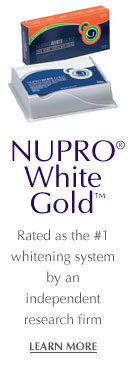

| < Previous 1 2 3 4 5 Next > |
| |
7
.
How can I stop grinding my teeth at night?
Grinding your teeth can be very damaging to the teeth and also difficult to stop. If vigorous grinding occurs at night, teeth can be worn down to the gumline because the instinctive reflex to stop does not work while you are sleeping. Grinding due to stress can only be cured by removing the stress trigger. If grinding continues, a nightguard may be prescribed to prevent ultimate damage to the teeth. |
| |
8
.
Are there any alternatives to dentures?
Dentures are no longer the only way to restore a mouth that has little or no non-restorable teeth. Strategically placed support, or implants, can now be used to support permanently cemented bridges, eliminating the need for a denture. The cost tends to be greater, but the implants and bridges more closely resemble the "feel" of real teeth. Dental implants are becoming the alternative of choice to dentures, but not everyone is a candidate for implants. Call your dentist for advice. |
| |
9
.
Are silver fillings, fluoride or x-rays, a danger to my health? What are the alternatives?
Dental amalgam, or silver filling material, is a mixture of mercury, and an alloy of silver, tin and copper. The release of mercury in silver fillings is so small that it is much less than what patients are exposed to in food, air and water. There are, however, other materials that can be used for restorations. These include gold, porcelain, and composite resins. Fluoride is a compound of the element fluorine, which is found universally throughout nature in water, soil, air and in most foods. Fluoride is absorbed easily into the tooth enamel, especially in children's growing teeth. Once teeth are developed, fluoride makes the entire tooth structure more resistant to decay and promotes remineralization, which aids in repairing early decay before the damage is visible. Radiographs, or x-rays, help your dentist determine the presence or degree of periodontal disease, abscesses, and many abnormal growths such as cysts and tumors. They can help pinpoint the location of cavities and other signs of disease that may not be possible to detect through a visual examination. All health care providers are sensitive to patients' concerns about exposure to radiation. Your dentist has been trained to prescribe radiographs when they are appropriate and to tailor the radiograph schedule to your individual needs. By using state-of-the-art technology, such as digital radiography, and by staying knowledgeable about recent advances, your dentist knows which techniques, procedures and X-ray films can minimize your exposure to radiation. |
| |
10
.
What are dental implants and how do they work?
Dental implants are substitutes for natural tooth roots and rely on the jawbone for support. Strategically placed, implants can now be used to support permanently cemented bridges, eliminating the need for a denture. The cost tends to be greater, but the implants and bridges more closely resemble real teeth. |
| |
11
.
What is a root canal?
A root canal is a procedure done to save the damaged or dead pulp in the root canal of the tooth by cleaning out the diseased pulp and reshaping the canal. The canal is filled with gutta percha, a rubberlike material, to prevent recontamination of the tooth. The tooth is then permanently sealed with possibly a post and/or a gold or porcelain crown. This enables patients to keep the original tooth. |
| |
12
.
When is the best time to remove wisdom teeth?
When the removal of wisdom teeth is determined necessary, it is best done when the roots are approximately 2/3rds formed, usually in the adolescent years. Removal at this time allows for an easier procedure and decreases the risk of damage to the nerves in that area. |